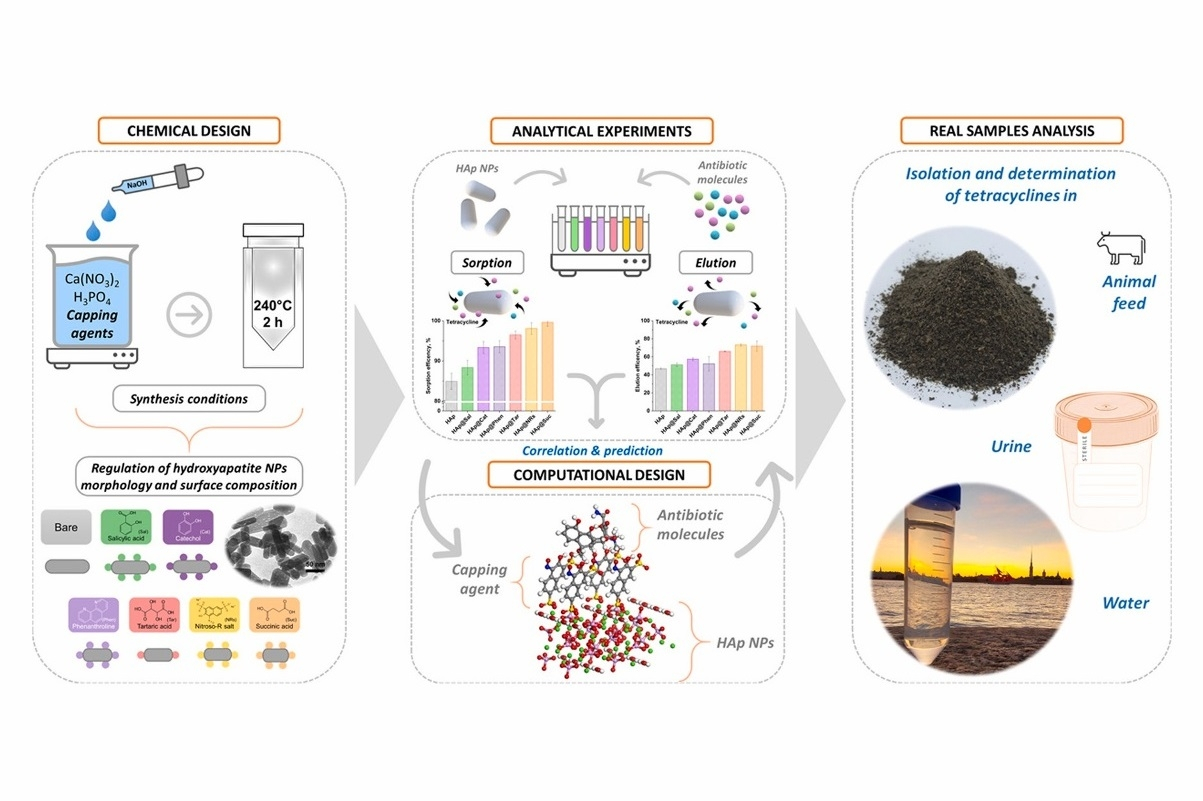A guide for chefs in chemistry: researchers from St Petersburg University developed a sorbent to remove antibiotics from wastewater

Chemists from St Petersburg University have developed an original procedure of matter synthesis and fabricated eco-friendly sorbents. The later will allow monitoring and removing antibiotics from wastewater.
Results of the research supported by a grant from the Russian Science Foundation have been published in the Journal of Hazardous Materials. It is an international forum that advances world class research by publishing articles in the areas of Environmental Science and Engineering.
Today, almost all wastewater contains tetracycline antibiotics. It is related with their widespread use in animal husbandry. Antibiotics in different concentrations get into the environment with the waste products of animals that received them with the feed while growing. At the same time, the conventional wastewater treatment procedure does not always ensure the complete removal of the antibiotics. Thus, their presence in water over time provokes the emergence of antibiotic-resistant bacterial strains that are hazardous to humans. The sorbent fabricated by the researchers from St Petersburg University may help to provide a fast and cost-effective wastewater treatment method. It will help reduce human impact on the environment and prevent the emergence of new hazardous bacteria.
The researchers from St Petersburg University have chosen biocompatible and biodegradable hydroxyapatite as a basis for an eco-friendly sorbent and developed a method that significantly reduces the time for the hydroxyapatite nanoparticle synthesis. They have modified nanoparticles by capping their surface with non-toxic molecules of modifiers and made it possible to fabricate materials that demonstrate high values of sorption for antibiotics. The surface capped with the modifiers presents better efficiency in absorbing antibiotics than the surface of a non-capped sorbent. The same efficiency was observed during a controllable elution step. Such effect was achieved by a change of the medium to regenerate the sorbent.
Our sorbent ensures the efficient removal of tetracycline from wastewater. Moreover, it can be used to increase the concentration of antibiotics and consequently the sensitivity during their quantitative determination while monitoring target substances in the wastewater.
Christina Vakh, the author of the analytical part of the research, Associate Professor in the Department of Analytical Chemistry at St Petersburg University (a member of the research group led by Andrey Bulatov, Professor of the Russian Academy of Sciences)
Despite the advances in contemporary science, causes and ways of numerous phenomena and processes that are likely to be used in high-tech devices are not yet fully understood. Therefore, scientists often use a direct-search method, in order to find the most suitable options. The researchers from St Petersburg University have presented a different strategy to fabricate suitable sorbents, meaning the shift to the focused investigation of their structure and surface composition and ensuring time-efficient development of novel sorbents.
Regarding the molecules of the target analytes, the researchers carry out computer modelling to choose suitable capping. This capping depends on information about the surface composition and crystal structure of the sorbent. After that, the scientists perform experiments with from one to three different sorbent samples. The outcome results in reducing both research costs, speed and the waste generated during the work with chemical reagents.
We may say that we have created a guide for chefs in chemistry. Before putting a new dish on the menu, chefs should cook and taste many versions. Our method makes it possible to determine how delicious the food is without cooking, reject unsuitable recipes, and present the most 'appetising' ones for tasting.
Mikhail Voznesenskiy, the author of the computational part of the research, Associate Professor in the Department of Physical Chemistry at the Institute of Chemistry at St Petersburg University
Olga Osmolovskaya is Associate Professor in the Department of General and Inorganic Chemistry, the leader of the group for synthesis and investigation of nanoparticles and nanostructured materials. According to her, both the application of experimental data to the computer modelling and the described strategy of sorbent fabrication do increase the accuracy of the expected outcome. The method of synthesis of nanoparticles and their surface modification, which the researchers from St Petersburg University have developed, allows for time-efficient and cost-efficient sorbent fabrication. Moreover, such a method may be implemented in the fabricating sorbents for other organic compounds.
This interdisciplinary research completed at the intersection of computational chemistry, inorganic materials science, and nanochemistry. It was carried out at St Petersburg University using the state-of-the-art equipment of the St Petersburg University Research Park and supported by the grant ' Novel miniaturised and environmentally friendly methods for chemical analysis of biological fluids and foods’ from the Russian Science Foundation.

